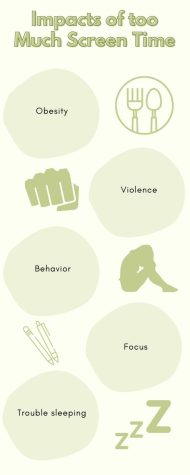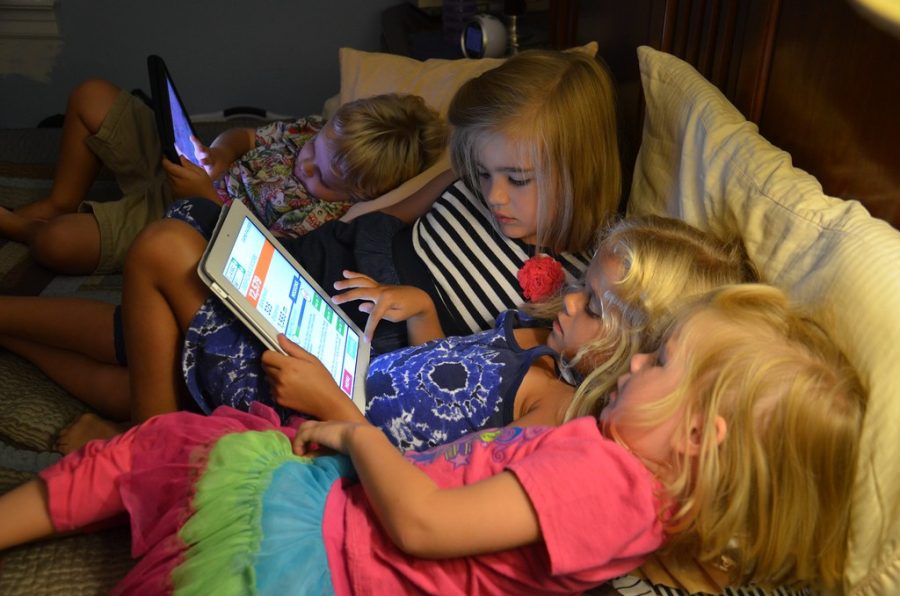Generation of Addiction
Every year the average age of children receiving their first phone declines, leading to an addiction, but are the side effects worth the satisfaction?
Four kids playing on Ipads with each other. (Creative Commons Image)
Growing up in a world where I have known smartphones, iPods, and other devices my whole life, I, like many, have spent a lot of time on them and have grown to depend on them for everything and let them distract and disrupt my life. As time goes on, parents are becoming more and more lenient with screen time. The New York Times stated that 85 percent of parents allow their children under the age of six to use technology. This data left me curious about how children growing up in the age of technology would be affected long-term, physically, and mentally.
Parents of young children have said that they use smartphones and tablets to prevent meltdowns, allow their child to play educational games, or have simply claimed that there is not enough evidence that would convince them to take away or limit their child’s screen time. But Dr. Dimitri’s “overstimulation hypothesis” proves that prolonged exposure to

rapid screen changes during the critical period of brain development (between the ages of 2 and 6) and it preconditions the brain to expect a high level of stimulations, which leads to inattention, hyperactivity, language delays, and cognitive problems later in life during real-life situations. It was also proven that half an hour of screen time was associated with a 49 percent increase in expressive speech delays. “In fact, all evidence points to the contrary, especially for children under 30 months, – Speech delays observed in this study could also be due to parents replacing more language-enriching activities with devices.” says pediatrician at Cincinnati Children’s Hospital Medical Center, Kristen Copeland. Becoming addicted to any device is not unusual because of the dopamine that is released when we get a notification, reward when we win a game, or the control we get on specific apps, addiction to screens is very prevalent in many young children. So how does one break this addiction without causing a tantrum? New York Times helped find ways to accomplish just that with the help of several psychologists and pediatricians. The first step is to set a regular schedule for screen time and have a distraction once their time is up, for example, after watching one episode of their favorite show, give them a snack or play a fun game together. Professor of pediatrics at the University of Michigan, Jenny Radesky, notes on the importance of parents maintaining this transition by saying, “Parents need to stay strong and stick to their plan even when faced with whining”
The memories that I remember most happened outside with friends and family. I feel as though children in this generation are missing out on a crucial part of their childhood because of distractions like their phones. Kids need to interact with real-life people in order to properly develop their social and emotional skills that will prepare them for later in life situations. Stepping away from the screen and doing activities that stimulate their brains such as playing with different colors, textures, and sounds for infants, and for teenagers taking an undistracted walk, reading a book, even engaging or starting a new hobby such as baking, drawing, crocheting, or playing sports are all things that can stimulate your brain which can lead to more successful behavior, sleep, communication and more.
Screen time for children should be limited but not completely banned. I understand that cell phones, tablets, and other electronics are going to continue to be a prominent aspect of most people’s lives, including children; so it is not reasonable to remove them entirely. But I think that children under the age of six years old should have limits in place to protect them and allow them to grow and develop properly. It’s always the parents’ decision on how they decide to raise their kids, but I think it is important that they understand all aspects and risks that can come alongside that.

Chloe is a senior at Liberty and this is her second year on staff. At Liberty, Chloe is involved in cheerleading and tennis. Outside of school, she enjoys...













